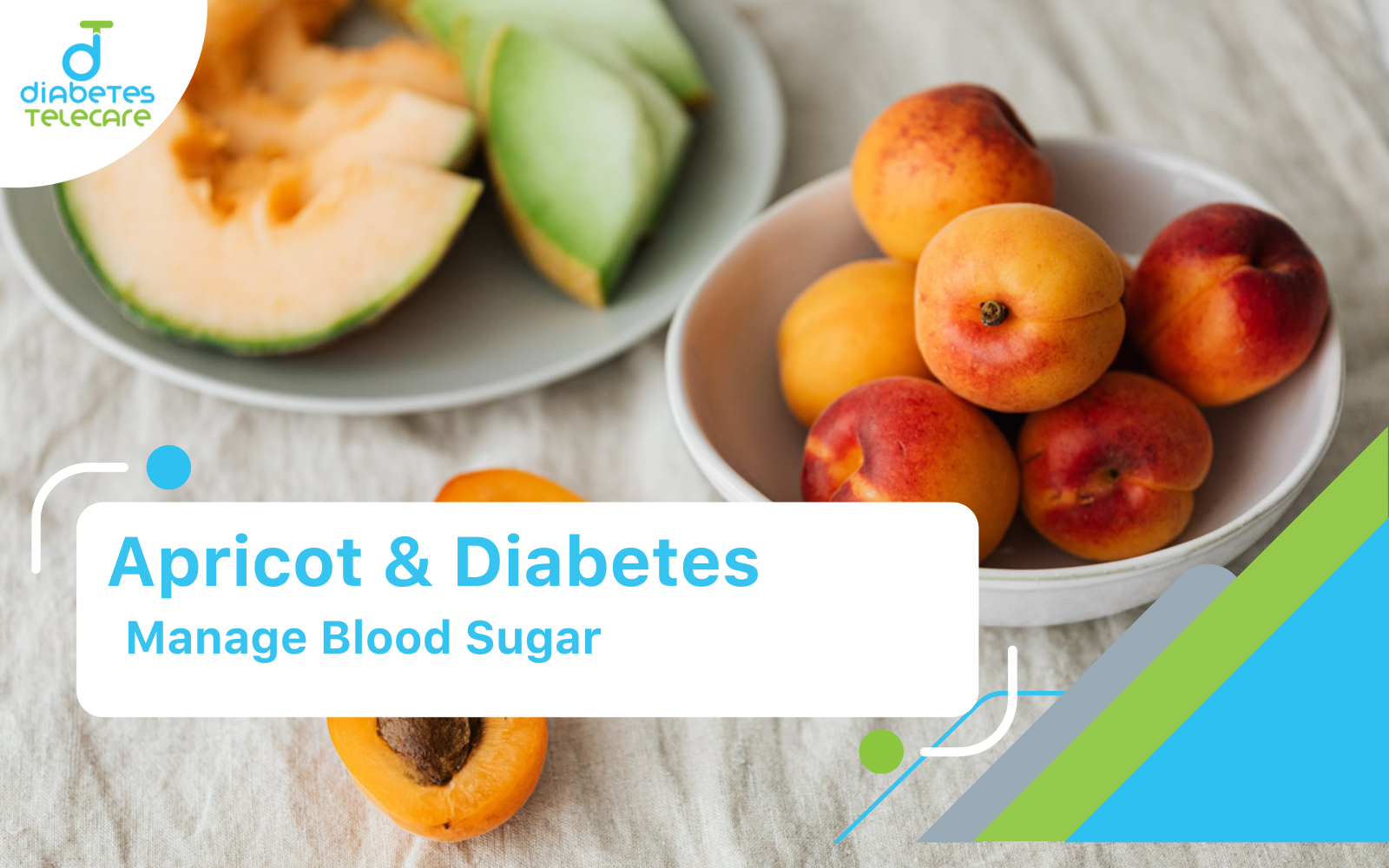
-
Posted By Diabetes TeleCare
-
-
Comments 0
Despite their small size, apricots are packed with taste and nutrients. Depending on the species, these yellow-orange fruits have a taste that ranges from sweet to sweet-tart and are high in vitamins and minerals. When ripe, apricots have velvety skin with soft fuzz, and their meat is tender and slightly juicy.
Apricots are rich in fiber and low in calories. It enhances blood sugar regulation by delaying the bloodstream’s absorption of sugar. A medium-sized apricot has around one gram of fiber.
They are therefore a wise option for diabetics who need to closely control their blood sugar levels. Apricots can benefit diabetics when they are part of a balanced, healthy diet.
Apricot and Diabetes: Benefits
Apricots may provide several advantages for diabetics, such as:
Nutrients
Iron, potassium, fiber, vitamins A and C, and other important minerals may all be found in good amounts in apricots. These nutrients can aid in the management of diabetes and are essential for general health.
Rich in Fiber
A wonderful source of fiber is apricots. It may aid in reducing the rate at which blood sugar is absorbed. Consequently, it enhances blood sugar regulation.
Rich in Antioxidants
Antioxidants found in abundance in apricots can aid in defending against inflammation and oxidative damage. It is linked to a higher risk of complications from diabetes, though.
Improved Digestion
A fantastic source of dietary fiber that is good for your digestive system is apricots. About half of the fiber in them is soluble and the other half is insoluble. Soluble fiber promotes the growth of beneficial bacteria and aids in the retention of enough water in the digestive system. Additionally advantageous to the amount of good gut flora is insoluble fiber.
Low-Calorie Content
Because apricots are low in calories, diabetics, who must control their weight, can profit from this.
Not to mention, apricots may be good for diabetics in terms of their health. It is nevertheless crucial to control blood sugar levels with a balanced diet, frequent exercise, and, if necessary, medication.
Nutritional Facts
With their rich nutritional profile, apricots are a fantastic way to get vitamins like C and A, which are essential for immune system support and skin health. They also provide a substantial quantity of dietary fiber, which helps to maintain healthy cholesterol levels and enhances digestive health. Additionally, apricots like other fruits are good for diabetes patients because they can help manage blood sugar levels when consumed in moderation.
Nutrients per Serving
One whole, fresh apricot contains:
- Calories: 17
- Protein: Less than 1 gram
- Fat: 0 grams
- Carbohydrates: 4 grams
- Fiber: 1 gram
- Sugar: 3 grams
- Cholesterol: 0 milligrams
- Sodium: 0 milligrams
Glycemic Index of Apricots
The low glycemic index (GI) of apricots is one of its key advantages for diabetics. The GI rating of apricots is around 35. Foods with a low GI rating absorb more slowly, according to studies. As a result, it can aid in controlling blood sugar levels and avoiding any unexpected rises.
Apricots’ glycemic index (GI) can change based on some variables, such as the kind, the degree of ripeness, and the method of preparation. Apricots, however, have a low to moderate GI.
The average glycemic index of a few popular apricot varietals is as follows:
- GI of 31–40 for fresh apricots (low to moderate)
- GI of 40–60 for dried apricots (low to moderate)
How to Include Apricots in a Diabetes Diet with HealthifyPro
Consume Fresh Apricots: They are a fantastic source of nutrients and fiber. You may consume them as a snack or mix them with yogurt, cereal, or salads.
Use Dried Apricots: A quick and easy snack, dried apricots are. Just keep in mind that portion sizes should be monitored because they have more sugar and calories than fresh apricots.
Try Apricot Puree: You may combine canned or fresh apricots to create your apricot puree. Thus, you can spread it over toast or use it as a topping for waffles or pancakes.
Include apricots in dishes: Apricots may be used in many dishes, including apricot chicken and apricot bars. Just be careful to monitor the recipe’s total carbohydrate content.
Are apricots beneficial for diabetes?
Controlling portion size is essential. Although apricots are a healthy choice, because of their natural sugar content, it’s recommended to consume them in moderation. Always keep in mind that optimal blood sugar management requires balance. A medium-sized fresh apricot has only 17 calories and about 3 grams of fiber, which makes it a great option for a diabetic-friendly snack.
Summary:
People with diabetes can get the benefits of the vitamins, minerals, and antioxidants found in apricots by including them in a well-balanced diet. Apricots may be enjoyed in a variety of ways due to their adaptability, whether they are used in recipes, dried, or fresh. When eating cashew nuts, it’s important to pay attention to portion quantities, though. To prevent ingesting too many calories and carbohydrates, limit your intake to one tiny handful (one ounce) at a time. To receive individualized assistance with cashew integration into your meal plan or if you have any special dietary issues, speak with a certified dietitian or other healthcare expert.
For personalized care and deeper insights into managing diabetes, consider booking an appointment with our specialist. Your health deserves the best attention.
For Contact: +92 323 3004420
Recent News
- Are Carrots Good for Diabetes? Benefits and Glycemic Impact
- Bananas and Diabetes – Can Diabetics Eat Bananas? Find out here
- Managing Diabetes with Broccoli: Health Benefits and Tips
- How a Low Carb Diet Helps Diabetics Control Blood Sugar
- Is Sweet Potato Good for Diabetes? How They Affect Blood Sugar



